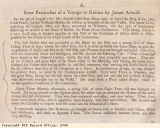Stories told by Europeans
Some Europeans were shocked by the treatment of enslaved Africans, which they witnessed. Many were disgusted by slavery.These feelings may have been behind some of the accounts written by Europeans. Whatever the sentiments, their words add yet more detail to what we know of the experiences of enslaved Africans.
This story is about ‘Eve’, and was told by Dr James Arnold. He was the ship’s surgeon of the slave ship the Ruby, from Bristol. The story was given, in 1787, as evidence to a parliamentary committee of inquiry. It was an inquiry looking into the slave trade and heard evidence from people who were for and against slavery. Arnold was giving this as evidence against the slave trade. It is what Eve told him of her enslavement.
“… a Goat had been found in her Father’s Garden, which, she said, had been purposely put there: That one of the Traders and great Men of the Place came in the Morning, and finding the Goat there, charged her Father with having stolen it, and said moreover, that nothing less would satisfy him for the Offence than One of his Daughters as a Slave. In consequence of this, he was obliged to produce them, or abide by the Consequences himself. They were Three in number, and the great Man, liking her the best whom we call Eve, took her and sold her to those Traders, who afterwards brought her to the Vessel.”
This extract is by the same ship’s surgeon and is about Eve’s sister. It is an account of a scene he witnessed.
“About three Months afterwards, a young Girl of about Eight Years old was brought on board. On being placed on the Quarter-deck, she either saw, or attracted the Notice of the other young Girl just mentioned [‘Eve’]. They very soon embraced each other, and went below. Their Features were much alike, and it appeared, upon Inquiry, that they were Sisters. Mr Arnold had never the Curiosity to inquire how she came into the Situation of a Slave.”
Zachary Macaulay was Governor of Sierra Leone in the 1790s. He was a supporter of the abolition of the slave trade and the institution of slavery. He wrote a letter to his sister from the Isle de Los, off Sierra Leone in West Africa, on 9 February 1795. This extract tells the story of a slave woman he met.
“ “My husband”, said she, “lost all by gaming, he was forced to sell me.” “Left you children behind?” “Yes” replied the poor creature with streaming eyes, and raised one finger, as an indication of the number. “Carry me back to Sierra Leone,” said she, “and I will serve you for ever, I can sew, and can work, I can do anything” … she then took several rings from her finger, and after burnishing them up as well as she could, she presented me with the best of them. I declined it and took [another] … which I now send you. A white handkerchief marked with my name was all that I had to give her. She accepted it with silent thankfulness and used it to dry her tears.”




